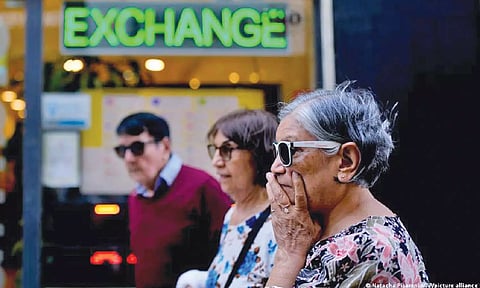

• TOBIAS KAUFER
Economic policy is the key issue in the runoff election in Argentina on Sunday, as voters decide between the economic policy of current Economy Minister Sergio Massa and his rival Javier Milei, a far-right libertarian economist known for his radical free-market liberalism. Argentina’s dire economic figures recently reported by the National Statistics Institute may speak for a change after the depressed Latin American country’s cost of living surged a staggering 142.7% over the year. The poverty rate in September stood at 38.9%, according to the Pontificia Universidad Catolica, a Catholic university based in Buenos Aires.
Argentina has for decades been plagued by financial chaos and weak economic growth that opposition candidate Milei has said is the result of successive left-leaning governments and their failed socialist economic policy. “Those who have led us into inflation and poverty are now trying to instigate fear [among the population]. Argentina was a world power at the end of the 19th century, then came the decline under the socialist governments,” Milei said earlier this week at a campaign event in Rosario, in the province of Santa Fe.
Milei has repeatedly accused his center-left rival of running a fear campaign that would denounce him as an ultra-right hard-liner who would seek to undo basic rights and democracy in Argentina. In his campaign, Milei has styled himself as the defender of the country against populism as he aims to “reduce privileges, not rights.”
Milei has attracted plenty of attention for his promises to radically overhaul the Argentine government and economy with a plan to eliminate the nation’s central bank and replace its currency with the US dollar. He wants to significantly reduce the state apparatus, lift laws and regulations on the economy and privatize state services. Other controversial proposals from his camp include liberalizing organ trade and privatizing Argentina’s territorial waters.
With his radical free-market orthodoxy, Milei hopes to spur economic growth and subsequently lift more Argentines out of widespread poverty. Sergio Massa is a veteran of Argentine politics and the new leader of the Peronist political movement which is based on the left-wing ideas of former President Juan Peron, who led Argentina several times between the 1940s and 1970s. The so-called Peronists have won nine of the last 12 free and fair presidential elections.
Massa has replaced Alberto Fernandez as the Peronist front-runner after the president announced he would not be seeking reelection in April. Massa was the winner of the first round of voting in October after making a surprise comeback from poor pre-election polls, capturing nearly 37% of the vote compared with 30% for Milei.
Massa, who has led Argentina’s economy for more than a year, pushed through several policies in support of his candidacy, including programs that return sales tax to certain workers and eliminate income tax for others. He has promised to maintain some economic policies that have been criticized by conservative economists, such as large subsidies for energy costs.
In addition, he hopes to generate enough tax and trade surpluses to help negotiations with the International Monetary Fund (IMF) on restructuring Argentina’s massive debt. Argentina has much to offer to the rest of the world, but has yet to leverage it for the benefit of the entire population. This includes large lithium deposits crucial for the transition to e-mobility, as well as offshore oil reserves and abundant natural gas reserves.